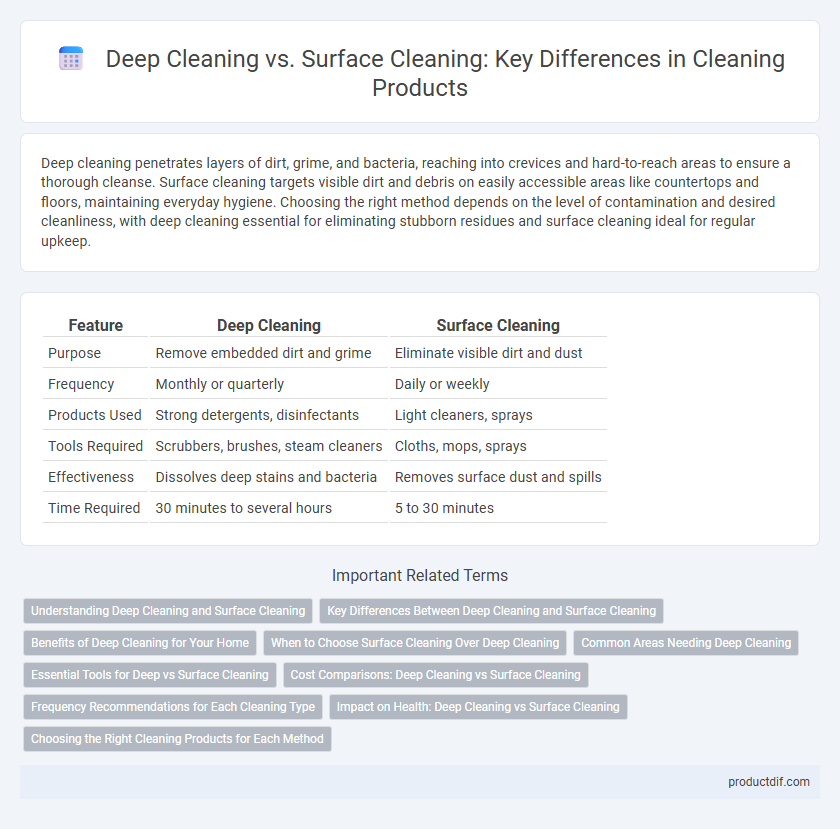Deep cleaning penetrates layers of dirt, grime, and bacteria, reaching into crevices and hard-to-reach areas to ensure a thorough cleanse. Surface cleaning targets visible dirt and debris on easily accessible areas like countertops and floors, maintaining everyday hygiene. Choosing the right method depends on the level of contamination and desired cleanliness, with deep cleaning essential for eliminating stubborn residues and surface cleaning ideal for regular upkeep.
Table of Comparison
| Feature | Deep Cleaning | Surface Cleaning |
|---|---|---|
| Purpose | Remove embedded dirt and grime | Eliminate visible dirt and dust |
| Frequency | Monthly or quarterly | Daily or weekly |
| Products Used | Strong detergents, disinfectants | Light cleaners, sprays |
| Tools Required | Scrubbers, brushes, steam cleaners | Cloths, mops, sprays |
| Effectiveness | Dissolves deep stains and bacteria | Removes surface dust and spills |
| Time Required | 30 minutes to several hours | 5 to 30 minutes |
Understanding Deep Cleaning and Surface Cleaning
Deep cleaning involves removing embedded dirt, grease, and bacteria from surfaces and hard-to-reach areas, ensuring thorough sanitation beyond visible grime. Surface cleaning targets visible dirt and debris on easily accessible areas, primarily focusing on maintaining daily cleanliness rather than sterilization. Understanding the difference helps in selecting appropriate cleaning products to effectively address specific hygiene needs.
Key Differences Between Deep Cleaning and Surface Cleaning
Deep cleaning targets ingrained dirt and bacteria in hard-to-reach areas using specialized tools and stronger cleaning agents, ensuring thorough sanitation beyond visible grime. Surface cleaning addresses everyday dirt and dust on easily accessible surfaces, employing milder products for routine maintenance. Key differences include the depth of dirt removal, frequency, and intensity of cleaning techniques tailored to contamination levels.
Benefits of Deep Cleaning for Your Home
Deep cleaning eliminates deep-seated dirt, bacteria, and allergens that surface cleaning often misses, promoting a healthier indoor environment. This thorough cleaning process extends the lifespan of surfaces and household items by preventing grime buildup and potential damage. Investing in deep cleaning enhances air quality and reduces the risk of illness, creating a safer and more comfortable home.
When to Choose Surface Cleaning Over Deep Cleaning
Surface cleaning is ideal for routine maintenance of visible dirt and grime on floors, countertops, and frequently touched surfaces, preserving cleanliness without extensive effort. Choose surface cleaning when the goal is to quickly refresh areas with light dust or spills, minimizing disruption and resource use. It is effective in high-traffic zones where deep cleaning is not immediately necessary, ensuring hygiene while extending time between intensive cleanings.
Common Areas Needing Deep Cleaning
Common areas needing deep cleaning include kitchens, bathrooms, and high-traffic zones such as entryways and living rooms where dirt, grime, and bacteria accumulate over time. Deep cleaning targets hard-to-reach surfaces like grout, baseboards, and behind appliances, eliminating built-up residue and allergens that surface cleaning misses. Regular deep cleaning in these areas improves indoor air quality and extends the lifespan of surfaces and fixtures.
Essential Tools for Deep vs Surface Cleaning
Essential tools for deep cleaning include heavy-duty brushes, steam cleaners, and high-powered vacuums designed to remove embedded dirt and grime from surfaces. Surface cleaning relies on microfiber cloths, spray cleaners, and lightweight vacuums to maintain cleanliness by removing dust and light debris. Selecting the right tools ensures effective removal of contaminants, preserving both hygiene and the longevity of surfaces.
Cost Comparisons: Deep Cleaning vs Surface Cleaning
Deep cleaning typically involves higher costs due to the use of specialized equipment, stronger cleaning agents, and extended labor time compared to surface cleaning. Surface cleaning, which targets visible dirt and debris, generally incurs lower expenses as it requires less intensive effort and fewer materials. Budget considerations should weigh the frequency and depth of cleaning required to balance cost-effectiveness with desired cleanliness levels.
Frequency Recommendations for Each Cleaning Type
Deep cleaning should be performed less frequently, typically every 3 to 6 months, to target embedded dirt, grime, and bacteria in hard-to-reach areas. Surface cleaning is recommended daily or weekly, depending on usage, to maintain cleanliness and prevent buildup of dust, spills, and light contaminants. Adhering to these frequency recommendations ensures effective hygiene management and prolongs the lifespan of surfaces.
Impact on Health: Deep Cleaning vs Surface Cleaning
Deep cleaning removes embedded dirt, allergens, and bacteria that surface cleaning often misses, significantly reducing health risks such as respiratory issues and infections. Surface cleaning primarily targets visible grime, providing a temporary clean but leaving behind harmful microbes that can trigger allergies and illness. Prioritizing deep cleaning in homes and workplaces enhances indoor air quality and supports long-term health by eliminating hidden contaminants.
Choosing the Right Cleaning Products for Each Method
Deep cleaning requires products with strong disinfectants, enzymes, or heavy-duty degreasers designed to break down dirt and grime embedded in surfaces, while surface cleaning typically uses milder cleaners like all-purpose sprays or wipes to remove dust and light stains. Selecting the right cleaning product depends on the method; for deep cleaning, opt for products with proven efficacy against bacteria and tough stains, whereas surface cleaning benefits from faster-acting, residue-free formulas. Understanding the specific cleaning needs ensures effective sanitation while protecting surfaces from damage.
Deep Cleaning vs Surface Cleaning Infographic

 productdif.com
productdif.com